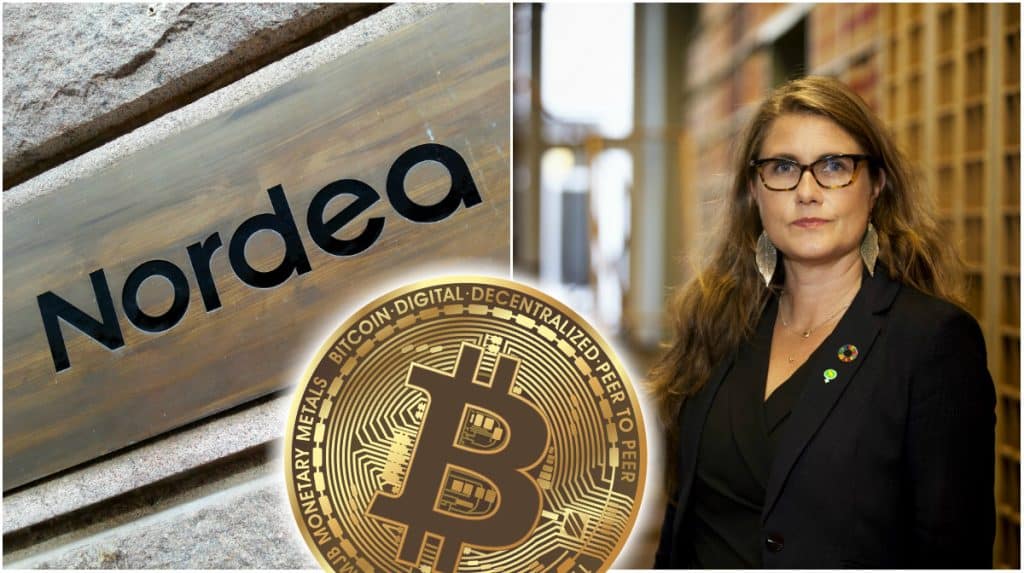The member of parliament and the economic-political spokesperson for the Swedish Green Party Janine Alm Ericson admits that her knowledge about cryptocurrencies is not “very profound”, but that she tries to read and keep up to date on developments.
“It’s a very interesting development. Sometimes one talks about eruptive things, and this has the potential to really change the way we handle economics”, she says to Trijo News.
Janine Alm Ericson, whose party is a government party, strongly supports the technology behind the blockchain and how it can be used, for example, “for different consumer issues and quality issues”.
See some risks
At the same time, Janine Alm Ericson sees some risks with cryptocurrencies, such as the economic risk many people are taking when speculating in cryptocurrencies because most of the coins are very volatile. But there are also other dangers, she believes.
“There have been a number of risks that I think you should take seriously. It is not traceable, which can hide criminal activities behind it. Of course, that is something that we are not seeing as positive. Some of them require very much energy to mine, and that is a problem from a resource efficiency perspective. I guess these are things that will also develop, but that’s what we’re seeing right now”, said Janine Alm Ericson.
Just to give a bit of nuance to the picture, there are many different cryptocurrencies, and you’re correct that there are some that are not traceable. But most, such as bitcoin, which is the largest one, are traceable. You can see how the values have been transferred, everything is open. Also, if you compare it with cash, for example, they are not traceable either.
“No, exactly. But cash is about to disappear in Sweden. But yes, the cryptocurrencies differ greatly”.
What are your thoughts about regulations, what should Sweden’s attitude be toward cryptocurrencies?
“It’s something one needs to look at when it’s growing more and more. Of course, it’s a signal to be taken seriously that Nordea (Swedish bank) says that you are not allowed to buy bitcoin there because it’s so unregulated so you don’t really know what it’s all about. Sometimes it may be that a regulation will help the progress move forward. We have no propositions for that right now, but we see that we need to be a constructive part of this development”.
This with Nordea, what is your opinion about that they’ve announced a ban for their employees to trade with bitcoin?
“I can understand it. Their duty towards the customer is also an important factor in this, and given that it is about such incredibly high sums, of course, they have put on a little bit of a precautionary perspective. But later, when things have stabilized, and we know a little more about what drives the trends, in value creation or reduction, one could imagine that the ban will be lifted. But from a consumer point of view, I think that it feels pretty good at the moment”.
But is it not up to the bank employees themselves to decide what to invest in their spare time?
“Yes, spare time, of course… But as I have understood it, the ban is about not being allowed to trade it on behalf of the bank. The other part we leave completely to the bank, and perhaps the union.”
What they have done is that everyone working at Nordea are not allowed to buy bitcoin.
“Really, as part of the employment contract?”
Well, it’s their rules.
“Well, then we presumably do not have anything to object to from a political point of view. In that case, that’s something between Nordea and their employees.”

Banks are very skeptical towards cryptocurrencies. For example, it is very difficult for companies that in some way work with blockchain or cryptocurrencies to get an account with a bank. Not only in Sweden but worldwide as well. And this despite the fact that many people follow rules and try to do things correctly. Is it fair that the banks should have such great power to determine things like that?
“We see that it’s difficult, not just for these players, but also for other fintech players that, just as you describe, tries to do things right, but have difficulty getting in. There, we need to be supportive. Finansinspektionen (Sweden’s financial supervisory authority) has also launched an innovation project to help here. Clearly, the banks see this as an upcoming competition, one which they do not want, but we see that we want more competition in the banking market instead, and for such kinds of services, and therefore, of course, this becomes extra unfortunate.
What can you, as politicians, do about it then?
“We are constantly trying to increase competition in the banking market, also within the EU. Such innovation projects that Finansinspektionen has is, of course, a part of it. We are constantly talking about the fact that we need to develop these sectors, and therefore, we cannot have another sector that stops it all. It requires some lubricants and some regulations, but also innovation.
“There is a clear unwillingness here”
How important is it that Sweden is at the forefront when it comes to this kind of technology development?
“I think it’s important, and to a large extent, we do. Regarding fintech, as Per Bolund (Sweden’s minister for financial markets) has worked a great deal to develop during this term of office, we are doing well in Europe. It is, of course, something that strengthens Sweden’s competitiveness and it is important that we stick to it”.
At the same time, it is some kind of a brake block if many companies that want to get started in Sweden, which businesses may be about blockchain or cryptocurrencies, have big problems with, for example, the banks. That can’t be a climate that favors entrepreneurship right?
“No, and I agree with that. That’s why we need to look at increased competition in the banking market. There are a lot of laws and regulations, but there is also a clear unwillingness here. But if it all works properly, then it will come a supplier of what is demanded”.
If one thinks it’s important that Sweden is at the forefront of blockchain technology and cryptocurrencies, should one vote for the Swedish Green Party?
“Yes, I absolutely think so. We think it’s a great technology. We will try to support it in different ways, and of course avoid the bad effects when they appear. Technology development and innovation is something we often talk about and that is important to us, as we look at Sweden’s development”, says Janine Alm Ericson.





